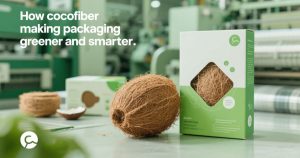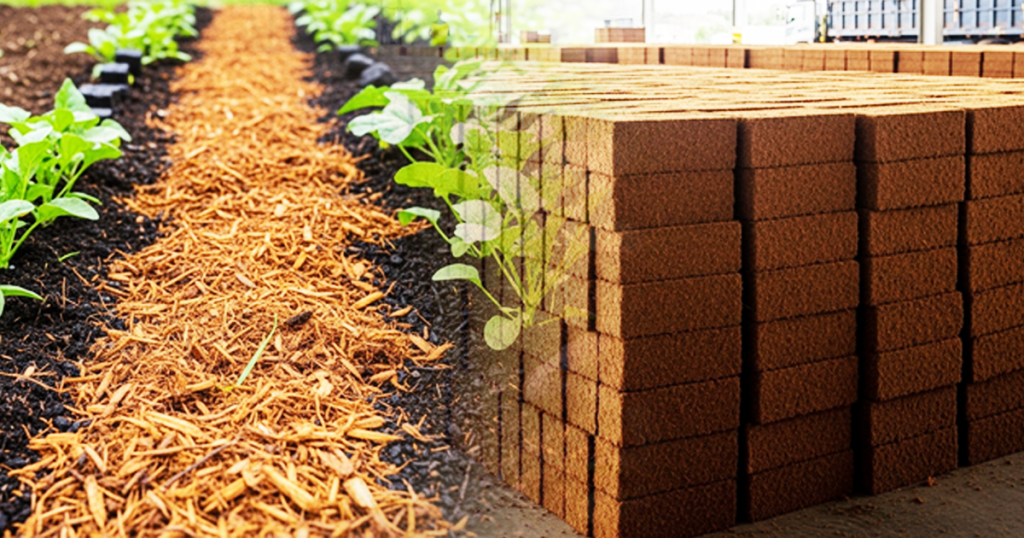A Sustainable Solution Rising from Coconut Waste
As the agricultural sector faces increasing pressure to adopt sustainable and efficient practices, cocopeat bricks derived from the fibrous husk of coconuts are emerging as a game changer.
From the perspective of a researcher deeply involved in cocopeat studies, this material is no longer an alternative, but a necessity in the global transition toward eco-conscious farming. Cocopeat, also known as coir pith, is a by-product of coconut processing.
Once considered waste, it is now reshaping the conversation around soil management and sustainable agriculture. In its compressed form cocopeat bricks it becomes an efficient, eco-friendly growing medium that has captured the attention of agri-tech innovators across the globe.
The growing popularity of cocopeat bricks is not a trend fueled by novelty. Instead, it is grounded in hard science. Extensive laboratory analyses and field trials reveal that cocopeat retains water up to eight times its weight while maintaining excellent aeration. These properties make it ideal for hydroponic farming, nursery cultivation, and greenhouse setups.
Scientific Merit Backed by Real World Application
As a researcher, I’ve observed cocopeat’s performance under varied agro climatic conditions. In controlled trials, plants grown in cocopeat media demonstrated improved root development, faster germination, and enhanced nutrient uptake.
Unlike traditional soil, cocopeat is pH-neutral, disease-resistant, and reusable reducing both input costs and environmental load. This innovation is also proving its worth beyond crop yields.
In drought-prone regions, cocopeat bricks are enabling farmers to reduce water usage by up to 40%. In urban settings, they are used for rooftop gardens and vertical farming, turning concrete landscapes into green havens. These applications validate cocopeat’s potential as a cornerstone of climate-resilient agriculture.
Cocopeat’s compatibility with organic and precision farming further underlines its value in the agri-tech ecosystem. When combined with sensors and automation, it allows for real-time monitoring of moisture and nutrient levels ushering in a new era of smart, data-driven farming.
An Eco-Friendly Alternative with Global Implications
The environmental impact of traditional peat extraction is increasingly criticized due to its role in releasing carbon emissions and destroying wetland ecosystems. Cocopeat bricks offer a compelling alternative. They are biodegradable, renewable, and sourced from a material that is abundantly available in tropical countries.
Countries such as India, Indonesia, and the Philippines major coconut producers are now seeing economic opportunities in cocopeat exports. Smallholder farmers are forming cooperatives to process and export cocopeat bricks, generating income while contributing to sustainable agriculture worldwide.
From an economic standpoint, the shift towards cocopeat is fostering new value chains in the agricultural sector. Equipment for compressing, packaging, and quality testing cocopeat is creating jobs and innovation hubs in rural communities. This aligns with the broader goals of the circular economy where waste becomes wealth.
Challenges and the Road Ahead
Despite its promise, the widespread adoption of cocopeat is not without challenges. Quality inconsistency, salt content, and lack of awareness among farmers remain key hurdles. However, ongoing research and technological improvements are addressing these issues.
Researchers like myself are working to standardize cocopeat processing and improve its integration with existing farming practices. Training programs and partnerships with agricultural extension services are being expanded to educate farmers about its benefits and proper usage.
Governments and NGOs are also stepping in, offering subsidies and pilot programs to promote cocopeat use. These collaborative efforts suggest that cocopeat bricks are not just a passing innovation, but a foundational material for future agriculture.
A Material for the Future
Cocopeat bricks are not merely a sustainable option they are a scientific breakthrough with real-world applications. As we confront the dual challenges of food security and environmental degradation, cocopeat offers a tangible solution that balances productivity with ecological responsibility.
This is more than an agricultural shift. It is an eco revolution powered by a humble coconut by-product and fueled by research, innovation, and global cooperation.







